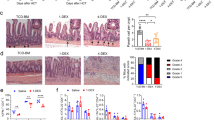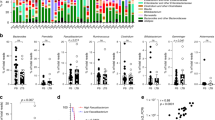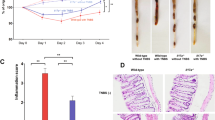Abstract
Hematopoietic SCT (HSCT) and high-dose chemotherapy are being explored as therapy for various human refractory immune-mediated conditions, including inflammatory bowel diseases (IBD). Nevertheless, the exact immunological mechanisms by which the BM cells (BMCs) or immunosuppression provide remission from these diseases is not yet clear. In this work, we investigated the role of these therapies in the modulation of gut mucosal inflammation in an experimental model of IBD. Colitis was induced in mice by 2,4,6-trinitrobenzenesulfonic acid and after CY was administered (200 mg/kg) alone (CY group) or followed by BMCs infusion (HSCT group). Animals were followed for 60 days. Both HSCT and CY reduced the histopathological features of colitis significantly. Infused cells were localized in the gut, and a marked decrease of CD4+ leukocytes in the inflammatory infiltrate on days +7 and +14 and of CD8+ cells on day +7 was found in both treatments allied to impressive reduction of proinflammatory Th1 and Th17 cytokines. Although chemotherapy alone was the best treatment regarding the induction of immunosuppressive molecules, only HSCT resulted in increased survival rates compared with the control group. Our findings indicate that high-dose CY followed by HSCT is effective in the modulation of mucosal immunity and in accelerating immune reconstitution after BMT, thus providing valuable tools to support the development and understanding of novel therapeutic strategies for IBD.
This is a preview of subscription content, access via your institution
Access options
Subscribe to this journal
Receive 12 print issues and online access
$259.00 per year
only $21.58 per issue
Buy this article
- Purchase on Springer Link
- Instant access to full article PDF
Prices may be subject to local taxes which are calculated during checkout





Similar content being viewed by others
References
Bouma G, Strober W . The immunological and genetic basis of inflammatory bowel disease. Nat Rev Immunol 2003; 3: 521–533.
Loftus Jr EV . Clinical epidemiology of inflammatory bowel disease: incidence, prevalence, and environmental influences. Gastroenterology 2004; 126: 1504–1517.
Wen Z, Fiocchi C . Inflammatory bowel disease: autoimmune or immune-mediated pathogenesis? Clin Dev Immunol 2004; 11: 195–204.
Shih DQ, Targan SR . Immunopathogenesis of inflammatory bowel disease. World J Gastroenterol 2008; 14: 390–400.
Cho JH . The genetics and immunopathogenesis of inflammatory bowel disease. Nat Rev Immunol 2008; 8: 458–466.
Neuman MG . Immune dysfunction in inflammatory bowel disease. Transl Res 2007; 149: 173–186.
Kolls JK, Lindén A . Interleukin-17 family members and inflammation. Immunity 2004; 21: 467–476.
Lim WC, Hanauer SB . Emerging biologic therapies in inflammatory bowel disease. Rev Gastroenterol Disord 2004; 4: 66–85.
Kozuch PL, Hanauer SB . Treatment of inflammatory bowel disease: a review of medical therapy. World J Gastroenterol 2008; 14: 354–377.
van Laar JM, Tyndall A . Adult stem cells in the treatment of autoimmune diseases. Rheumatology 2006; 45: 1187–1193.
Burt RK, Loh Y, Pearce W, Beohar N, Barr WG, Craig R et al. Clinical applications of blood-derived and marrow-derived stem cells for nonmalignant diseases. JAMA 2008; 299: 925–936.
Brodsky RA, Petri M, Smith BD, Seifter EJ, Spivak JL, Styler M et al. Immunoablative high-dose cyclophosphamide without stem-cell rescue for refractory, severe autoimmune disease. Ann Intern Med 1998; 129: 1031–1035.
Petri M, Jones RJ, Brodsky RA . High-dose cyclophosphamide without stem cell transplantation in systemic lupus erythematosus. Arthritis Rheum 2003; 48: 166–173.
Gladstone DE, Zamkoff KW, Krupp L, Peyster R, Sibony P, Christodoulou C et al. High-dose cyclophosphamide for moderate to severe refractory multiple sclerosis. Arch Neurol 2006; 63: 1388–1393.
Tehlirian CV, Hummers LK, White B, Brodsky RA, Wigley FM . High-dose cyclophosphamide without stem cell rescue in scleroderma. Ann Rheum Dis 2008; 67: 775–781.
Leung Y, Geddes M, Storek J, Panaccione R, Beck PL . Hematopoietic cell transplantation for Crohn's disease; is it time? World J Gastroenterol 2006; 12: 6665–6673.
Petri M, Brodsky R . High-dose cyclophosphamide and stem cell transplantation for refractory systemic lupus erythematosus. JAMA 2008; 295: 559–560.
Hawkey CJ . Stem cell transplantation for Crohn's disease. Best Pract Res Clin Haematol 2004; 17: 317–325.
Herzog EL, Chai L, Krause DS . Plasticity of marrow-derived stem cells. Blood 2003; 102: 3483–3493.
Brittan M, Alison MR, Schier S, Wright NA . Bone marrow stem cell-mediated regeneration in IBD: where do we go from here? Gastroenterology 2007; 132: 1171–1173.
te Velde AA, Verstege MI, Hommes DW . Critical appraisal of the current practice in murine TNBS-induced colitis. Inflamm Bowel Dis 2006; 12: 995–999.
Neurath MF, Fuss I, Kelsall BL, Stüber E, Strober W . Antibodies to interleukin 12 abrogate established experimental colitis in mice. J Exp Med 1995; 182: 1281–1290.
van Bekkum DW . Stem cell transplantation for autoimmune disorders. Preclinical experiments. Best Pract Res Clin Haematol 2004; 17: 201–222.
Burt RK, Testor A, Craig R, Cohen B, Suffit R, Barr W . Hematopoietic stem cell transplantation for autoimmune diseases: what have we learned? J Autoimmun 2008; 30: 116–120.
Kaminitz A, Mizrahi K, Yaniv I, Farkas DL, Stein J, Askenasy N . Low levels of allogeneic but not syngeneic hematopoietic chimerism reverse autoimmune insulitis in prediabetic NOD mice. J Autoimmun 2009; 33: 83–91.
Sartor RB . Therapeutic manipulation of the enteric microfloral in inflammatory bowel diseases: antibiotics, probiotics, and prebiotics. Gastroenterology 2004; 126: 1620–1633.
Elson CO, Cong Y, McCracken VJ, Dimmitt RA, Lorenz RG, Weaver CT . Experimental models of inflammatory bowel disease reveal innate, adaptive, and regulatory mechanisms of host dialogue with the microbiota. Immunol Rev 2005; 206: 260–276.
Gross-Bellard M, Oudet P, Chambon P . Isolation of high-molecular-weight DNA from mammalian cells. Eur J Biochem 1973; 36: 32–38.
van Bekkum DW . Experimental basis of hematopoietic stem cell transplantation for treatment of autoimmune diseases. J Leukoc Biol 2002; 72: 609–620.
Voltarelli JC, Couri CE, Stracieri AB, Oliveira MC, Moraes DA, Pieroni F et al. Autologous nonmyeloablative hematopoietic stem cell transplantation in newly diagnosed type 1 diabetes mellitus. JAMA 2007; 297: 1568–1576.
Komori M, Tsuji S, Tsujii M, Murata H, Iijima H, Yasumaru M et al. Involvement of bone marrow-derived cells in healing of experimental colitis in rats. Wound Repair Regen 2005; 13: 109–118.
Hayashi Y, Tsuji S, Tsujii M, Nishida T, Ishii S, Nakamura T et al. The transdifferentiation of bone-marrow-derived cells in colonic mucosal regeneration after dextran-sulfate-sodium-induced colitis in mice. Pharmacology 2007; 80: 193–199.
Brittan M, Chance V, Elia G, Poulsom R, Alison MR, MacDonald TT et al. A regenerative role for bone marrow following experimental colitis: contribution to neovasculogenesis and myofibroblasts. Gastroenterology 2005; 128: 1984–1995.
Khalil PN, Weiler V, Nelson PJ, Khalil MN, Moosmann S, Mutschler WE et al. Nonmyeloablative stem cell therapy enhances microcirculation and tissue regeneration in murine inflammatory bowel disease. Gastroenterology 2007; 132: 944–954.
Okamoto R, Matsumoto T, Watanabe M . Regeneration of the intestinal epithelia: regulation of bone marrow-derived epithelial cell differentiation towards secretory lineage cells. Hum Cell 2006; 19: 71–75.
Szczepanik M, Gryglewski A, Bryniarski K, Stachura J, Ptak W . Experimental inflammatory bowel disease—role of T cells. J Physiol Pharmacol 2000; 51: 333–336.
Steinman L . A brief history of TH17, the first major revision in the TH1/TH2 hypothesis of T cell-mediated tissue damage. Nat Med 2007; 13: 139–145.
Andoh A, Ogawa A, Bamba S, Fujiyama Y . Interaction between interleukin-17-producing CD4+ T cells and colonic subepithelial myofibroblasts: what are they doing in mucosal inflammation? J Gastroenterol 2007; 17: 29–33.
Lawrance IC, Maxwell L, Doe W . Inflammation location, but not type, determines the increase in TGF-β1 and IGF-1 expression and collagen deposition in IBD intestine. Inflamm Bowel Dis 2001; 7: 16–26.
Marek A, Brodzicki J, Liberek A, Korzon M . TGF-β (transforming growth factor-beta) in chronic inflammatory conditions—a new diagnostic and prognostic marker? Med Sci Monit 2002; 8: 145–151.
Nemoto Y, Kanai T, Makita S, Okamoto R, Totsuka T, Takeda K et al. Bone marrow retaining colitogenic CD4+ T cells may be a pathogenic reservoir for chronic colitis. Gastroenterology 2007; 132: 176–189.
Oyama Y, Craig RM, Traynor AE, Quigley K, Statkute L, Halverson A et al. Autologous hematopoietic stem cell transplantation in patients with refractory Crohn's disease. Gastroenterology 2005; 128: 552–563.
Cassinotti A, Annaloro C, Ardizzone S, Onida F, Della Volpe A, Clerici M et al. Autologous haematopoietic stem cell transplantation without CD34+ cell selection in refractory Crohn's disease. Gut 2008; 57: 211–217.
Hawkey CJ, Snowden JA, Lobo A, Beglinger C, Tyndall A . Stem cell transplantation for inflammatory bowel disease: practical and ethical issues. Gut 2000; 46: 869–872.
Barkholt L, Löfberg R . Resetting the immune system in refractory Crohn's disease: is autologous hematopoietic stem cell transplantation the way forward? Gastroenterology 2005; 128: 786–789.
Mizoguchi A, Mizoguchi E . Inflammatory bowel disease, past, present and future: lessons from animal models. J Gastroenterol 2008; 43: 1–17.
Acknowledgements
We thank Lenaldo Branco Rocha (Confocal Microscopy Laboratory—School of Medicine of Ribeirão Preto) for technical assistance in confocal microscopy. Confocal microscopy was supported by grants from FAPESP (2004/08868-0). This study was supported by grants from Conselho Nacional de Desenvolvimento Científico e Tecnológico (CNPq), Financiadora de Estudos e Projetos (FINEP) and Fundação de Amparo à Pesquisa do Estado de São Paulo (FAPESP).
Author information
Authors and Affiliations
Corresponding author
Ethics declarations
Competing interests
The authors declare no conflict of interest.
Rights and permissions
About this article
Cite this article
Godoi, D., Cardoso, C., Ferraz, D. et al. Hematopoietic SCT modulates gut inflammation in experimental inflammatory bowel disease. Bone Marrow Transplant 45, 1562–1571 (2010). https://doi.org/10.1038/bmt.2010.6
Received:
Revised:
Accepted:
Published:
Issue Date:
DOI: https://doi.org/10.1038/bmt.2010.6



